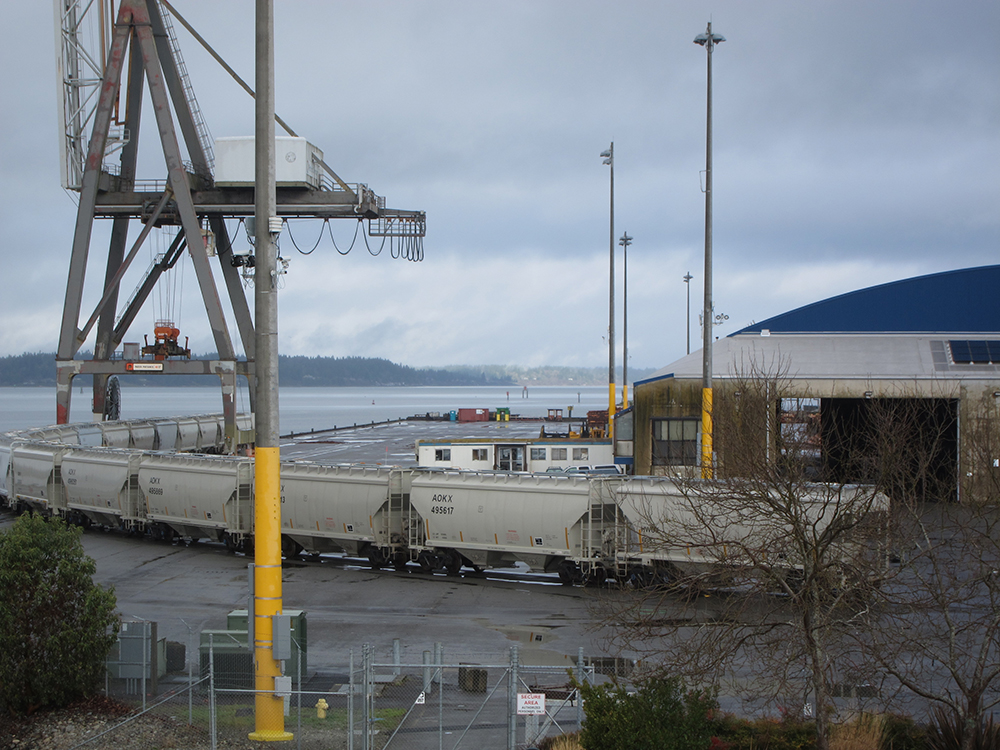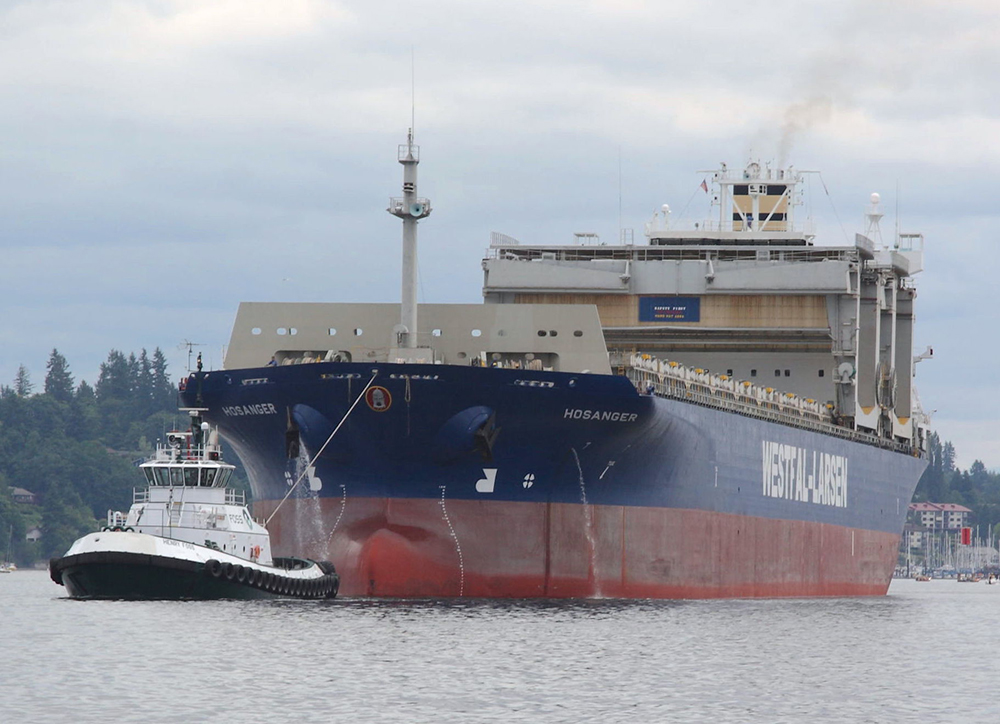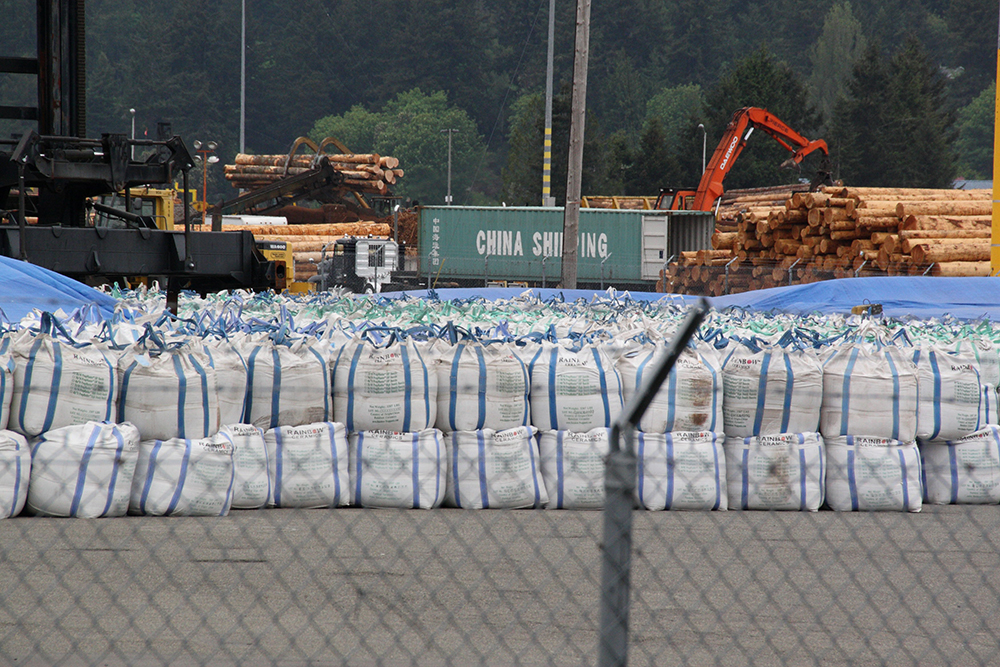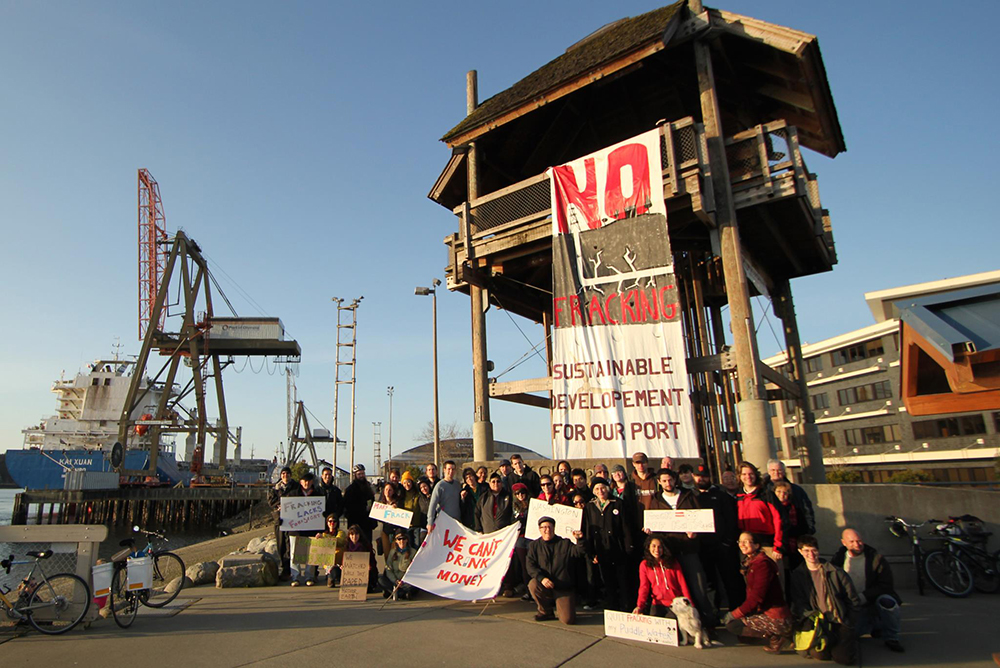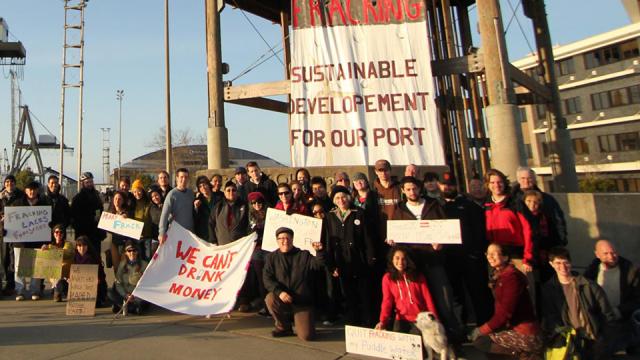
Port of Olympia: Eye of the Fracking Needle
The Port of Olympia, nestled in historic Budd Inlet, is at the southernmost reach of the Puget Sound, of the Salish Sea, in the Pacific Northwest. Its moderate climate gives rise to some of the most productive (i.e. fastest-growing) forests in the world. The Port’s main business is timber and bagged ceramic proppants – a refined, aluma-silica ceramic bead product used in fracking. If you haven't heard of proppants yet, you will. The proppants are imported from China and they play an essential role in the new fracking economy.
For a small facility in a quaint little town, Port of Olympia is no stranger to controversy; it’s been the site of concerted protest efforts in the recent past. In May 2006, when the port was being used by the Army to deploy brigades overseas, a human blockade stood in the way of Stryker armored vehicles. Local activists focused on the port to rally against the Iraq and Afghanistan wars. The last deployment of military hardware through Port of Olympia was in November 2007, amid a flurry of protest. But more on the Port's war protests later.
Port Olympia and Fossil Fuels
While the Pacific Northwest is lacking relative to its neighbors in certain assets of fossil fuels, the region sits at the heart of numerous proposals for expanded export operations. The area is becoming an essential energy market supply chain transportation link.
The world sits at the cusp of a new era of extreme fossil fuel extraction, and at least three new, major North American developments stand to put the Pacific Northwest in the cross-hairs of export transportation from these proposed projects. They are: 1) Coal from the Wyoming/Montana Powder River Basin, 2) Oil Sands (aka Tar Sands) from the Canadian Boreal Forest, and 3) Fracked Oil from the North Dakota Bakken deep-Earth formation.
For the people of Olympia and surrounding Thurston County, the third in this list has a special significance because the hardened proppant beads coming through the Port of Olympia are what make possible the deep-fracking operations in North Dakota. This means that our local public institution – our Port – has been complicit in leveraging environmental, social and economic impacts upon the region of Northwest North Dakota and beyond.
So What Exactly is Happening at Port Olympia?
Prior to 2010, the Port had seen slow times. Some years, it got as few as three ships visiting and operated at a loss. In 2013, that number had risen to about three dozen. The activities of the Marine Terminal have helped to pull the Port out of the red. But most visits have been by logging ships, which take the region's resources away to Asia.
Since 2012, the proppants trade has also been active. Port staff specifically sought contracts to move proppants through the Port. And staffers visited China and North Dakota in order to set up the deal, which you can read about in this Spring 2013 article by Hildi Flores. The first shipment of proppants arrived in Port of Olympia aboard the MV Hosanger in July 2012.
The “bagged ceramic proppant” is a manufactured silica/alumina product. Proppants are hardened beads. They are hydraulically injected into wells, where they will remain in relative perpetuity. Once hydraulic pressure in the wells has been released, they rest and prop open hydraulically fractured fissures. Proppants are specifically designed to be very strong, because the wells in the Bakken formation are especially deep – among the deepest wells on the planet, with some going down more than 8,000 feet.
Once at Port, the bags of proppants are stored outside under blue tarps until they are processed and loaded into covered hopper train cars. Processing consists of cutting open the bags and emptying the beads into a collection bin, where they are mechanically scooped up onto a conveyer belt and loaded into the train cars. Port has expressed interest in building another warehouse specifically for the purpose of keeping the proppants dry.
What Are We Doing to Stop Port Complicity in Fracking?
At a March 24 Port Commissioners meeting, 25 people rose to speak against a proposed new warehouse to be built to house fracking proppants. Dan Leahy asked the commissioners to consider adopting a resolution similar to the cities of Seattle and Bellingham, calling for a moratorium on new fossil fuel export infrastructure until the safety of oil trains can be ensured.
Meanwhile, resident Bourtai Hargrove said, “I am deeply concerned about the climate disruption my grandchildren are facing now, and in the near future.” She cited a recent statement from the American Association for the Advancement of Science that concludes, “Global Warming poses a clear and present danger to civilization.”
And Sharron Coontz asked the Commissioners to “study ways to keep Longshore employed and the economy thriving, without supporting an industry with such terrible consequences.” Video coverage of the meeting is available via TCTV.
Local groups including Olympia F.O.R. Confronting the Climate Crisis and South Sound Rising Tide, as well as concerned individuals, have rallied to the cause. And newly elected Port Commissioner Sue Gunn, who understands the harmful environmental and biological impacts of the industry, has also risen to the challenge by becoming vocal in opposition to the proppants shipments.
The Port of Olympia community understands that there is an urgent ecological and economic need for a transition to renewable energy. For this reason, public support for the oil industry – in the form of continued subsidies – is widely seen as out of step with the basic need to level the playing field and allow renewables to compete in the marketplace.
Other efforts have included rallies to mark the arrival of ships with fracking cargo. These rallies, in 2012 and 2013, ranged in size from a handful to a few dozen people attending. March 2013 saw multiple rallies when the Kai Xuan ship delivered proppants.
The Port of Olympia is situated near stores and public amenities, making the area more hospitable to gatherings than some other ports. Coffee shops, the Olympia Farmers Market, and even a Public Plaza near the Port Marine Terminal industrial yard create a space where people can gather in relative comfort and convenience. The massive industrial zone of the Port of Tacoma, for example, is a much more forbidding environment.
In 2006 and 2007, a movement sprang up to oppose the use of the Port to handle deployments to Iraq of battle groups from then Fort Lewis Army Base (now known as JBLM, or Joint Base Lewis-McChord.) The protest was organized by people associated with a movement that called itself Port Militarization Resistance.
If rallies and other political efforts like petitions prove unsuccessful, there are certainly those here who would like to see more direct forms of action and popular resistance, perhaps even taking cues from the Port Militarization Resistance. Community members, noting the similarities of this effort, have asked how strategies might evolve to stage direct physical, nonviolent and civil disobedient opposition to the shipments of proppants. Stay tuned for developments in that arena.
I am currently circulating a petition to call on the current Commissioners to end port shipments of materials for fracking. The Commissioners are divided, with Sue Gunn firmly opposed to shipping materials for fracking and Bill McGregor firmly in support. The third Commissioner, George Barner, has vacillated in his statements, and appeared to show sincere concern that the proppants shipments have been used to support a harmful, dangerous industry. You are invited to sign the petition here.
Robert F. W. Whitlock is an Olympia resident and activist for peace.
3 WAYS TO SHOW YOUR SUPPORT
- Log in to post comments

